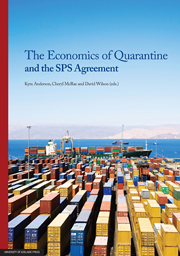Book contents
- Frontmatter
- Contents
- List of tables, figures and boxes
- Acronyms
- Preface
- List of contributors
- 1 Introduction
- PART I The multilateral rules under WTO
- PART II The ‘appropriate level of protection’
- PART III Adding more economics to risk analysis
- PART IV Specific health and environmental risks from trade
- 15 Measuring the effect of food safety standards on African exports to Europe
- 16 GMOs, the SPS Agreement and the WTO
- 17 Food safety policy in the WTO era
- 18 Environmental risk evaluation in quarantine decision making
- PART V Conclusion
- APPENDIX The legal text of the SPS Agreement
16 - GMOs, the SPS Agreement and the WTO
from PART IV - Specific health and environmental risks from trade
Published online by Cambridge University Press: 05 June 2013
- Frontmatter
- Contents
- List of tables, figures and boxes
- Acronyms
- Preface
- List of contributors
- 1 Introduction
- PART I The multilateral rules under WTO
- PART II The ‘appropriate level of protection’
- PART III Adding more economics to risk analysis
- PART IV Specific health and environmental risks from trade
- 15 Measuring the effect of food safety standards on African exports to Europe
- 16 GMOs, the SPS Agreement and the WTO
- 17 Food safety policy in the WTO era
- 18 Environmental risk evaluation in quarantine decision making
- PART V Conclusion
- APPENDIX The legal text of the SPS Agreement
Summary
This chapter addresses the question: how might a new quarantine issue, namely genetically modified organisms (GMOs), impact on the World Trade Organization's rules and their interpretation by its Dispute Settlement Body. It suggests that the GMO issue is almost certain to affect the way the WTO's Sanitary and Phytosanitary (SPS) Agreement is interpreted and, should it come under sufficient pressure, re-negotiated. Since national quarantine policy officials are involved in both dispute settlement and rules-negotiating at the WTO, this chapter provides a glimpse of what might be in store for them in those capacities as well as in their work as quarantine decision-makers in the future. The chapter also includes an empirical analysis of the trade and welfare effects that could be involved in GMO cases. This has two purposes. First, it provides some idea of the potential trade and welfare effects of SPS policy reactions to the GMO issue. Second, it illustrates a methodological approach that, to the authors' knowledge, is more comprehensive than any used by previous analysts for estimating the market effects of quarantine policies. The methodology would be inappropriate for cases involving just one small product in a small country. However, for across-the-board reviews of quarantine measures, and for cases involving major products and major traders -(as with GMOs) the economy-wide, general equilibrium approach used here is very relevant. And it will become even more so as and when economic assessment becomes more of a mainstream activity in quarantine analysis in the future (if not by quarantine officers, then certainly by agricultural policy advisors and trade negotiators concerned with the domestic and trade effects of SPS measures both at home and abroad).
- Type
- Chapter
- Information
- The Economics of Quarantine and the SPS Agreement , pp. 305 - 331Publisher: The University of Adelaide PressPrint publication year: 2012



